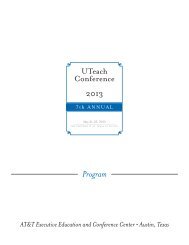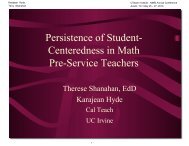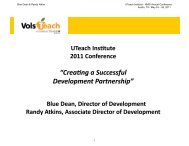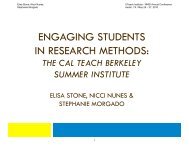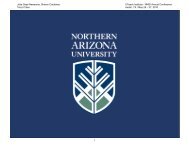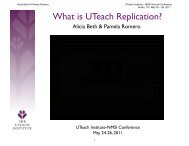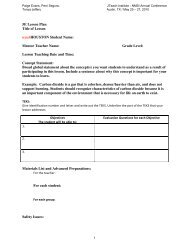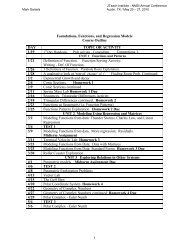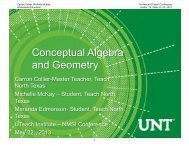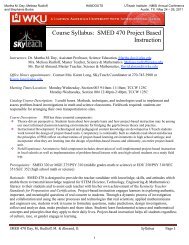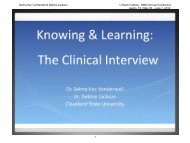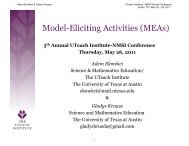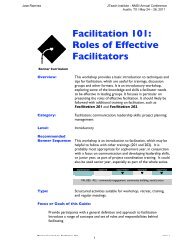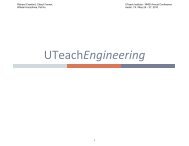Physics by Inquiry - The UTeach Institute
Physics by Inquiry - The UTeach Institute
Physics by Inquiry - The UTeach Institute
Create successful ePaper yourself
Turn your PDF publications into a flip-book with our unique Google optimized e-Paper software.
Jill Marshall<br />
<strong>UTeach</strong> <strong>Institute</strong> - NMSI Annual Conference<br />
Austin, TX / May 25 – 27, 2010<br />
Jill Marshall<br />
Science & Math Education<br />
University of Texas at Austin<br />
1
Jill Marshall<br />
<strong>UTeach</strong> <strong>Institute</strong> - NMSI Annual Conference<br />
Austin, TX / May 25 – 27, 2010<br />
Overview of course<br />
Housed in Science & Math Ed Center<br />
10-22 students (usually no TA).<br />
Pre-service elementary & high school science<br />
teachers (<strong>UTeach</strong>), SME graduate students,<br />
general education students<br />
No prerequisite<br />
Based on <strong>Physics</strong> <strong>by</strong> <strong>Inquiry</strong><br />
Typically covers 3 PBI units (or parts of units).<br />
2
Jill Marshall<br />
<strong>UTeach</strong> <strong>Institute</strong> - NMSI Annual Conference<br />
Austin, TX / May 25 – 27, 2010<br />
<strong>Physics</strong> <strong>by</strong> <strong>Inquiry</strong><br />
McDermott, L.C. & the <strong>Physics</strong> Education Group at the<br />
University of Washington (1996). <strong>Physics</strong> <strong>by</strong> inquiry.<br />
New York: John Wiley and Sons.<br />
3
Jill Marshall<br />
<strong>UTeach</strong> <strong>Institute</strong> - NMSI Annual Conference<br />
Austin, TX / May 25 – 27, 2010<br />
Format<br />
Modeled after UW course (<strong>Physics</strong><br />
405/407).<br />
No lecture: Students work through<br />
exercises in small groups (2-3) with<br />
regular instructor check points,<br />
occasional group discussion.<br />
2-3 in-class exams, including a<br />
comprehensive final.<br />
Writing assignments, including journals,<br />
reflections and papers.<br />
4
Jill Marshall<br />
<strong>UTeach</strong> <strong>Institute</strong> - NMSI Annual Conference<br />
Austin, TX / May 25 – 27, 2010<br />
Why do we need a special<br />
physics course for teachers?<br />
“60% might be good enough for<br />
engineers, but not for teachers.”<br />
Key areas of precollege curriculum<br />
neglected in university programs.<br />
Teachers need to develop “PCK”,<br />
metacognitive strategies.<br />
Provides opportunities for research into<br />
learning and teaching.<br />
5
Jill Marshall<br />
<strong>UTeach</strong> <strong>Institute</strong> - NMSI Annual Conference<br />
Austin, TX / May 25 – 27, 2010<br />
Robust content understanding<br />
Students typically leave traditional<br />
courses, even well taught ones, without<br />
solid content understanding. (e.g.,<br />
McDermott & Shaffer, 1992; Thacker et<br />
al., 1994)<br />
Even reformed lecture-lab-tutorial courses<br />
do not reach the level of student<br />
achievement possible in a course<br />
emphasizing teaching and learning<br />
(Redish,1998; Marshall & Dorward,<br />
2000).<br />
6
Jill Marshall<br />
<strong>UTeach</strong> <strong>Institute</strong> - NMSI Annual Conference<br />
Austin, TX / May 25 – 27, 2010<br />
Robust content understanding<br />
More than 20 peer-reviewed articles<br />
documenting effectiveness<br />
Typical pretest scores (10-15%) and<br />
typical ‘second generation’ post test<br />
scores (80-90%)<br />
“I never thought this hard in my whole life.<br />
My brain hurts.”<br />
7
Jill Marshall<br />
<strong>UTeach</strong> <strong>Institute</strong> - NMSI Annual Conference<br />
Austin, TX / May 25 – 27, 2010<br />
Empowerment<br />
What’s so interesting for me, when it came time<br />
to study, I thought, I don’t need to study<br />
because I already know all this […] That was<br />
cool. I liked not having to cram for the final<br />
exam.<br />
8
Jill Marshall<br />
<strong>UTeach</strong> <strong>Institute</strong> - NMSI Annual Conference<br />
Austin, TX / May 25 – 27, 2010<br />
Critique of previous<br />
instruction<br />
Cause it’s embarrassing to me… when I<br />
did that pretest, I should have known it<br />
absolutely, even as a science teacher not<br />
even as an engineer, as a science<br />
teacher I should know that, that’s my job,<br />
to know that stuff for my kids and I<br />
didn’t... How dare they have given me an<br />
A!<br />
9
Jill Marshall<br />
<strong>UTeach</strong> <strong>Institute</strong> - NMSI Annual Conference<br />
Austin, TX / May 25 – 27, 2010<br />
Dave: And again, it’s this confusing<br />
equation that people don’t like. But it’s<br />
what I was brought up on and I can’t run<br />
away from it. I don’t know…<br />
Linda: You were brought up on that, eh?<br />
Dave: Yeah, it was like my [pacifier].<br />
Linda: Here’s your bottle and here’s your<br />
equation.<br />
10
Jill Marshall<br />
<strong>UTeach</strong> <strong>Institute</strong> - NMSI Annual Conference<br />
Austin, TX / May 25 – 27, 2010<br />
Artifacts of instruction<br />
“Yeah, just wait. You’re about to have to<br />
unlearn everything you thought you<br />
learned.”<br />
11
Jill Marshall<br />
<strong>UTeach</strong> <strong>Institute</strong> - NMSI Annual Conference<br />
Austin, TX / May 25 – 27, 2010<br />
Metacognition<br />
12
Jill Marshall<br />
“[Expletive deleted]! How<br />
can I know this and not<br />
know it!”<br />
<strong>UTeach</strong> <strong>Institute</strong> - NMSI Annual Conference<br />
Austin, TX / May 25 – 27, 2010<br />
13
Jill Marshall<br />
<strong>UTeach</strong> <strong>Institute</strong> - NMSI Annual Conference<br />
Austin, TX / May 25 – 27, 2010<br />
Pedagogical Content Knowledge<br />
Student without prior physics experience<br />
developed alternative mathematical<br />
model of motion: d = “a” t 2 ; “a” is the<br />
change in average velocities over time.<br />
“It’s like Good Will Hunting.”<br />
“I would go home at night and I would<br />
think it about for hours. Like I would fall<br />
asleep thinking about we had this one<br />
question that was asked at this point, and<br />
why was it asked…”<br />
14
Jill Marshall<br />
<strong>UTeach</strong> <strong>Institute</strong> - NMSI Annual Conference<br />
Austin, TX / May 25 – 27, 2010<br />
Teachers need to learn <strong>by</strong><br />
inquiry<br />
And I know now, having gone through it, it’s not<br />
something that I could just look at the book and<br />
say OK, I’ve got this. It’s something that you<br />
have to do, in order to learn it.<br />
…there is only so much you can learn in college<br />
the way it’s taught, it’s taught traditionally for<br />
the most part in a big classroom and then you<br />
just solve problem and problem and problem …<br />
If I would have learned [the PBI] way in college,<br />
oh! “<br />
15
Jill Marshall<br />
HANDOUT<br />
<strong>UTeach</strong> <strong>Institute</strong> - NMSI Annual Conference<br />
Austin, TX / May 25 – 27, 2010<br />
SCI 360-3: Physical Science (Unique Number 12565) Fall 2009<br />
“What you have been obliged to discover for yourself leaves a path in your mind that you can use<br />
again when the need arises.” (G.C. Lichtenberg)<br />
INSTRUCTOR: JILL MARSHALL, marshall@mail.utexas.edu, SZB 462E, 232-9685 (O)<br />
OFFICE HOURS: TUESDAY 3:00-3:45 IN SZB 462E OR BY APPOINTMENT.<br />
ATTENDANCE POLICY: <strong>The</strong> work in this course is largely hands-on and will be done in groups.<br />
<strong>The</strong>refore it is mandatory that you attend class sessions as arranged. In the case of an excused absence<br />
(documented University business, illness, family or personal emergency, religious observances), please<br />
contact the instructor and your partners as soon as possible, preferably in advance, to arrange a makeup<br />
session. Unexcused absences will result in loss of credit.<br />
ACCOMMODATIONS FOR STUDENTS WITH DISABILITIES: As part of our commitment to educational<br />
equity, the University of Texas at Austin and your instructor will provide, upon request, appropriate<br />
academic accommodations for qualified students with disabilities. For more information, please<br />
contact your instructor or the Office of the Dean of Students at 471-6259, 471-4641 TTY.<br />
COURSE GOALS:<br />
- Students will develop a deeper conceptual understanding of targeted concepts from the precollege<br />
physical science curriculum, and create a coherent conceptual model of the target<br />
content topics.<br />
- Students will learn to reflect on and characterize their own learning and that of others.<br />
- Students will experience this content through a process of guided inquiry and develop an<br />
understanding of how the process of inquiry interacts with student learning.<br />
- Students will develop an understanding of what is meant <strong>by</strong> pedagogical content knowledge<br />
and enhance and characterize their own pedagogical content knowledge in physical science.<br />
- Students will become familiar student difficulties in learning particular topics in physical<br />
science, and the effectiveness of various modes of teaching and learning to overcome these.<br />
TEXT: <strong>Physics</strong> <strong>by</strong> <strong>Inquiry</strong>, Volume 2, (McDermott and the University of Washington PEG), available<br />
at the University Coop, online booksellers, and sometimes at Half Price Books.<br />
COURSE GRADE: Performance in the course will be assessed on the basis of<br />
(1) Oral assessments (checkouts) (20%)<br />
(2) Homework (10%)<br />
(3) Paper (25%)<br />
(4) Midterm (20%) & Final Exam (25%)<br />
ORAL ASSESSMENTS: Certain key experiments and exercises direct you to have your responses<br />
checked. Discuss the relevant issues with your partners and prepare a written response. After<br />
reviewing it and discussing portions of your response with you, a staff member will either give your<br />
response a check (√) or will ask you to revise your response. In general, you should not proceed to the<br />
next experiment or exercise until you have been “checked off.”<br />
NOTEBOOK: You will need to keep a notebook of your observations about your work with summaries<br />
of important results. You will be asked to summarize the main findings of each day’s work, identifying<br />
H - 1
Jill Marshall<br />
HANDOUT<br />
<strong>UTeach</strong> <strong>Institute</strong> - NMSI Annual Conference<br />
Austin, TX / May 25 – 27, 2010<br />
the key events that led to those findings, and sometimes discuss how they apply to a specific problem<br />
or question. This journal will be an important resource for your reflection paper and should serve as a<br />
guide to organize your thinking and help you study for exams.<br />
PAPER AND ESSAY ASSIGNMENTS: This course is designed to promote reflection on learning and<br />
understanding. A great deal of emphasis is placed on your ability to provide a written discussion of the<br />
concepts you are studying, as well as the reasoning you use to arrive at your conclusions. A paper and<br />
several essay assignments will be given during the course. A description of each paper assignment,<br />
with a scoring rubric, will be distributed separately. All work on papers should be done individually.<br />
Any material that you include that is not in your own words must be cited clearly as to its source.<br />
Likewise, you should give credit for ideas that originate from another source. Using another person’s<br />
words or ideas (including words and ideas posted on the Internet!) without due credit is plagiarism and<br />
is a violation of University rules.<br />
ACADEMIC HONESTY: Students who violate University rules on scholastic dishonesty are subject to<br />
disciplinary penalties, including the possibility of failure in the course and/or dismissal from <strong>The</strong><br />
University. Since such dishonesty harms the individual, all students, and the integrity of <strong>The</strong><br />
University, policies on scholastic dishonesty will be strictly enforced.<br />
READINGS<br />
Brown, T.R., Slater, T.F., & Adams, J.P., (1998). Gender differences with batteries and bulbs, <strong>The</strong><br />
<strong>Physics</strong> Teacher, 36 (9), 526-527.<br />
McDermott, L.C. & P.S. Shaffer (1992). Research as a guide for curriculum development: An example<br />
from introductory electricity, Part I: Investigation of student understanding, American Journal of<br />
<strong>Physics</strong>, 60 (11), 994-1003.<br />
Shaffer, P.s. & McDermott, L.C. (1992) Research as a guide for curriculum development: An example<br />
from introductory electricity, Part II: Design of instructional strategies, American Journal of<br />
<strong>Physics</strong>, 60, 1003-1013.<br />
Wosilait, K., Heron, P.R.L., Shaffer, P.S. & McDermott, L.C. (1998). Development and<br />
assessment of a research-based tutorial on light and shadow, American Journal of <strong>Physics</strong>,<br />
66 (10), 906-913.<br />
H - 2
Jill Marshall<br />
HANDOUT<br />
<strong>UTeach</strong> <strong>Institute</strong> - NMSI Annual Conference<br />
Austin, TX / May 25 – 27, 2010<br />
SCHEDULE<br />
Date Homework due at beginning of class Experiments/Exercises in class<br />
9/1 •<br />
PBI VOL.2, ELECTRIC<br />
CIRCUITS 1.1-1.11<br />
• EC 1.12-1.14, Summary and CRITIQUE OF<br />
BROWN, SLATER & ADAMS (1998) AND THE<br />
9/8<br />
LETTER IN RESPONSE. HOW DID THE WAY<br />
YOUR GROUP APPROACHED THE TASK OF<br />
LIGHTING THE BULB COMPARE WITH THE<br />
WAY THESE STUDENTS DID IT? (1-2 PAGES)<br />
EC 2.1-2.6, EC 3.1-3.4<br />
9/15 • EC 2.7, p.494 2.1, 2.3,3.3 EC 3.5-3.10, EC 4.1-4.6<br />
9/22 • p.498 3.5, p. 499-500 4.2-4.4 EC 4.7-4.11, EC 5.1-5.5<br />
9/29 • p.501 4.5,4.6, 5.4 EC 5.6-5.7, EC 6.1-6.5<br />
10/6<br />
- P.503 5.5, p.504 6.1-6.3, READ<br />
MCDERMOTT & SHAFFER (1992)<br />
• EC 7.1-7.11, 7.14-7.16<br />
10/13 - p.505 7.1, p.506 7.3-7.4 • EC 8.1-8.6<br />
10/17 - Midterm Paper due <strong>by</strong> 8AM • Saturday (no class)<br />
10/20 - P.507 8.1-8.3 • EC Review<br />
10/27 -<br />
11/3<br />
- DESCRIPTION OF WHAT DETERMINES<br />
HOW AN IMAGE FROM A LIGHT SOURCE<br />
WILL LOOK. HOW DOES THE<br />
SHAPE/POSITION OF THE LIGHT SOURCE<br />
AFFECT IT? HOW DOES THE<br />
SHAPE/POSITION OF A MASK BETWEEN<br />
THE LIGHT SOURCE AND THE SCREEN<br />
AFFECT THE IMAGE?<br />
• EC Midterm, Light &<br />
Shadows Intro<br />
• LO 1.1-1.8, 2.1-2.5<br />
11/10<br />
- p.619 1.2-1.5, Summary/reflection on<br />
Wosilait et al.<br />
• LO 2.6-2.11, 4.1-4.8<br />
11/17 - LO 2.7-2.9, 2.12, p.622 2.1, 2.2, • LO 6.1-6.3, 7.1-7.4<br />
11/24 - p.625 4.1-4.3, p.629 6.1 • LO 7.5-7.6, LO 8.1-8.3<br />
12/1 - p. 630 7.2, p.631 8.1-8.2, LO 8.6-8.8 • LO 10.1-10.11<br />
12/8 - LO 8.9, p.633 10.1-10.3 • Optional Review, 4-7 PM<br />
12/9<br />
(Wed.)<br />
-<br />
• Final Exam, 2:00-5:00 PM,<br />
SZB 316<br />
H - 3



